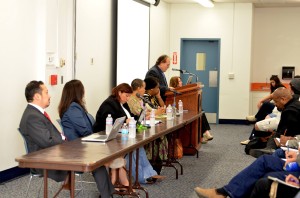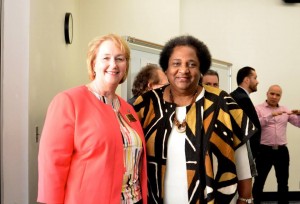

On the morning of Friday, March 14, five highly acclaimed professors, chairs and directors hosted a panel discussion titled, “Honoring Academic Legacies of Diversity at San Diego Mesa College and Beyond: Equity and Valuing Critical Contributions of Chicana/o Studies and Black Studies Departments.” During the three and a half hours, they discussed the importance of ethnic studies in educational settings.
The event opened with a welcoming speech from San Diego Mesa College President Pamela Luster. She pointed out how not only was it the 50th anniversary of Mesa, but also the 50th anniversary of the Civil Rights Act. Then, she exposed how underappreciated Black and Chicano Studies are.
“One of the most disturbing questions I get is, ‘What’s the value of a degree in Ethnic Studies?’” This particular point became the theme of the discussion.
Before the panelists spoke, Charles Zappia (Dean of the School of Social/Behavioral Sciences) and Thekima Mayasa (Chair of Black Studies and Mesa professor) gave brief backgrounds on the history of these two departments as a whole, as well as specifically at Mesa.
Zappia informed the audience about former Professor Gracia Molina de Pick, who not only established our first course in Chicano studies, but also gave an $80,000 endowment to the Chicano Studies Department. She also played a crucial role in creating El Plan de Santa Barbara, which is considered to be the “master plan to institutionalize Chicano Studies in academia.” Zappia also discussed the increase of Chicano students by 60% in the last five years and the progress the department has made from finally relocating after three decades from a temporary bungalow to the G-Building in 2002.
Professor Mayasa debunked myths about taking Black Studies classes by emphasizing the importance of having a broad understanding of history and explaining that everyone can benefit from this humanistic approach to learning.
“There’s a perspective that Black Studies is only for black people or that Chicano Studies is only for Chicano people.” But in fact, many of her students from all different types of backgrounds have referred to her classes as life changing. When it came to Ethnic Studies being overlooked as a department, she refuted with, “Diversity not only matters, it’s imperative.”
The first panelist, José Gradilla, is the chair of both the Black Studies and Chicano Studies Departments at CSU Fullerton. He started his speech with discussing the importance of statistics, but how they aren’t enough to actually get things done.
“Demographics alone are not enough for us to have change,” he reinforced. He also brought up that statistically speaking, the community college system is very critical in the educational paths for students of color and has a high correlation with their success levels. According to Gradilla, the classes in these departments differ from others because students are required to engage in intellectual disobedience.
Beatriz Tapia, an associate professor of the Chicano Studies Department at East Los Angeles Community College, spoke following Gradilla. The college at which she teaches is mainly attended by Latino and Asian American students. Her department started off as Mexican American studies and was changed to Chicano Studies after El Plan de Santa Barbara. Despite having one of the most large and diverse Chicano Studies Departments in a community college, it has been difficult for Asian American Studies and Black Studies to grow on her campus since they are under other departments instead of their own. Tapia believes they deserve their own departments just like Chicano Studies.
“It’s not just taking a brown crayon and coloring history brown,” Tapia exclaims as a counter to popular belief.
The next panelist, Valerie Cuevas, gave political background to the importance of these departments. She said these departments focused on history of the “…lack of respect for difference.” According to statistics, 53% of students K-12 are Chicana/o, which is why she believes Assembly Bill 1750 is extremely important. This particular bill makes it possible for ethnic studies to be taught in these grades and not just in college settings.
After Cuevas wrapped up her speech, a familiar face took the podium. Starla Lewis, retired Mesa Black Studies professor and former Department Chair of 11 year, opened her speech by telling us about herself in an unconventional way. She told us about the day of her birth being one day after her mom’s 18th birthday.
“I like to think of myself as a belated birthday present,” said Lewis. Her positive outlook made everyone in the audience attentive and interested. When it came to education she said, “The purpose of education? Knowledge of self.”
“Don’t assume that since people are black that they know where they came from,” she explained, saying that Black Studies was important for many of her students.
“Before you become a teacher, before you become a doctor, before you become a scientist, you need to become human,” said a former student of Lewis. She was so passionate about her Black Studies classes she compared the night before the start of each semester to being a child on Christmas Eve, “excited and unable to sleep.”
Last but not least, Assembly Member Shirley Weber took the podium. By this point, the discussion was running behind on time.
“Any person who organizes a 50 minute panel with five people of color, obviously hasn’t been a person of color very long,” joked Weber.
Weber is one of nine members of the Black Caucus, and was elected in November, 2012 to represent the 79th Assembly District in California. During the Budget Crisis, she explained that ethnic studies was one of the first departments to go.
“When you eliminate history… you basically rip out how they (the students) see themselves in the future,” she explained. She was proud to note that California State Institutions have more Ethnic and Women’s Studies than any other state in the U.S. and are a huge promoter of First Five. First Five encourages parents to teach their children to read, talk, and sing by a very early age. At the moment the organization is trying to pass a bill that will not only require children to attend kindergarten, but to attend all day.
After Weber spoke, there was a short fifteen minute break followed by a Q&A session between the panelists and the audience members. Questions ranged from how to incorporate the community with ethnic studies curriculum to expanding related classes to elementary, middle and high schools. Once the microphone had been passed around for a while, one white female stole the spotlight. She was deaf and had an interpreter speak as she signed to the panelists. As she started to tear up, she explained how her husband is Hispanic and they have a child together. Even though she was white, she wanted to show her appreciation for this discussion and agreed on the importance of ethnic studies. This was arguably one of the most powerful moments of the whole discussion.
Another audience member, a young black female, asked a question about the origin of black people compared to white people. This seemed to grasp everyone’s attention. She described how her white friends would say they were Irish or German, but she didn’t know how to identify herself to a country. In response to this, Starla Lewis stood up out of her chair and explained that for black people, since they were ripped away from their identity, who they are isn’t about labels, but about context.
